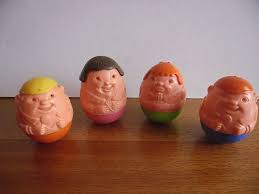Bullying is insidious. It is an attack by a thousand cuts. It belittles and undermines, it gradually wears the targeted person away until they are the shadow of who they once were. Yet at the same time each action is seen as so small that alone they would not be considered significant. But cutting again and again causes deeper longer lasting wounds.
I cannot remember a time in school before I was singled out as someone to be teased. There we go - words that undermine the intense power of bullying, 'just teasing', 'kids will be kids', 'it's only a joke'.
What decides who will be the focus of a bully? Someone different from the rest, someone perceived as weak, someone maybe seen as a threat that a bully wants to stop, it can be so many things. Maybe it also depends on the context of the bullying, childhood or adult, by those who should be your peers, or those with power over you.
Back to school, primary and secondary, right up to leaving the upper 6th. By then my year group bullies had either left or grown out of the worst, but younger year group lads had taken up the slack.
I wasn't beaten up, no bruises to show, and yes I am grateful for that, yet it also made it hard for me to complain or prove what was happening. It even made me feel I had no right to complain or be bothered.
Yet it is the verbal bruises that don't heal, 'no one will ever like you', 'no one will be your friend'. When you are told something day in and day out for years it gradually becomes your inner voice too. Even stones are worn away by the continual drops and flow of water.
Once a bully has the power then even things that would sound like a neutral act come with sinister messages. I clearly remember the day in my mid teens when this dawned on me. I had been encouraged to 'tell' on examples, but when a bully says hello to you in a way that is threatening, a reminder that they are there, the look in the eye etc. But what can I report, that 'he said hello'?
And that brings us to bullying in the workplace, governments, or churches. Sometimes it is a targeted attack on individuals, sometimes it is an overall culture that is more indiscriminate in the aggression shown.
As with the Priti Patel, Home Office, case it takes great courage to speak out about bullying. You know that they will twist each individual cut, 'just banter', 'need to toughen up in this workplace', 'you are just being oversensitive' and the current fashionable one 'don't be such a snowflake'.
Yet again, as in so many contexts including too often the church, even with evidence accepted as valid no one has to take responsibility. In many organisations it is a case of no one wanting to rock the boat. In church contexts, which I see though those I know and also through union work, there is a lack of courage to challenge bullying behaviour even when it may have driven away several ministers in a row. Or where a senior minister affects others. Bullying can come from any side, and those targeted can be of any type.
There is malice intended in some cases, a deliberate targeting of someone or a certain group. But yes it can be unrecognised by even the bully themselves, this does not excuse behaviour and attitudes to others that consistently and significantly damages them. If someone is left emotionally crippled and suicidal by your actions then you have responsibility for those actions, and those words.
And among the greatest lies ever taught to us as children 'sticks and stones may break my bones but names will never harm me'.
The truth is 'stick and stones may break my bones but names can break the soul'.
There are many reasons I despair at our current government, but standing up for someone who has been found through independent review to have used bullying behaviours, shouting and swearing at workers in her team, is definitely one of them. But then I know all too well that we in the church structures have a plank in our own eyes too. And that is cause to weep.




